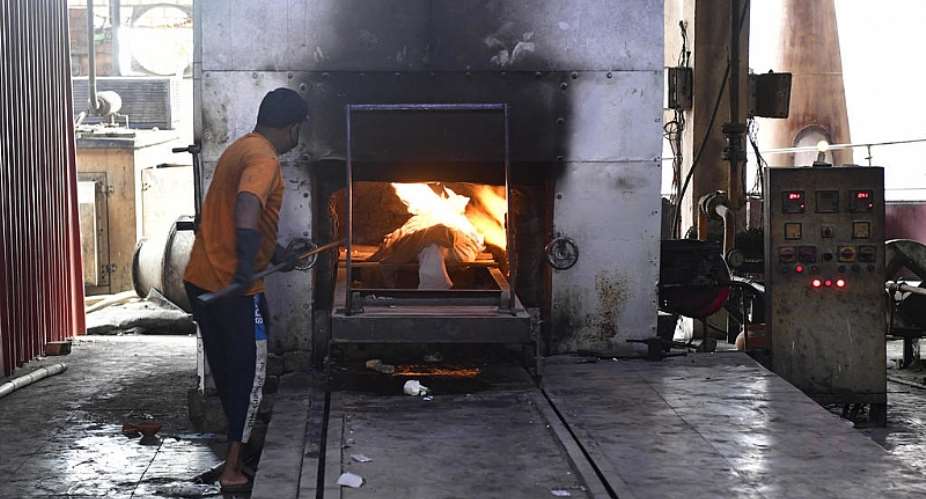India has generated 18,000 tonnes of Covid-19 biomedical waste in the last four months, with the western state of Maharashtra topping the list, according to the country's pollution watchdog.
The waste is being collected, treated and disposed of by 198 common biomedical waste treatment facilities.
The Central Pollution Control Board (CPCB) said it needed to be tracked in order to address it with adequate hazardous waste management infrastructure.
According to the data, Maharashtra has generated 3,587 tonnes of Covid-19 waste. This was followed by Tamil Nadu, Gujarat, Kerala, Uttar Pradesh, Delhi and Karnataka – the states where infections have been the highest.
Though the CPCB had issued specific guidelines for handling, treatment and disposal of such waste at healthcare facilities, quarantine centres, homes, sample collection centres and laboratories, experts believe Covid-19 waste is not being separated in some places.
Reselling used PPE
“We have been working on raising awareness about Covid-19 waste in various parts. There have been incidences of people in slum areas of Old Delhi selling the used masks and gloves at cheap prices,” said Priti Mahesh, Chief Programme Coordinator at Toxics Link, an environmental NGO.
“Contaminated masks and gloves are hazardous and pose serious health threat to the waste pickers who mostly deal with the waste with bare hands.”
The pollution watchdog has directed that masks and gloves used by people other than Covid-19 patients, whether infected or not, should be cut and kept in paper bags for a minimum of 72 hours before discarding it.
Protective Personal Equipment (PPE) like body suits, face masks, hand gloves and shoe covers have played a crucial role in battling the raging coronavirus pandemic.
However, lax norms in planning and ensuring proper post-use disposal of these highly infectious items have triggered a parallel crisis as bio-medical waste is piling up across cities.
'Incentivise sustainability'
Much of it is being dangerously dumped in landfills as incineration plants have begun to run out of capacity.
“The government needs to act now to ensure a green recovery that incentivises sustainability. Our health care governance and industry must also quickly respond, install toxic gas absorbing filters and take all necessary steps for safe disposal of the huge amounts of biomedical waste being generated,” says Soumya Dutta, an environmental expert.
In May, the CPCB developed a mobile application to monitor coronavirus-related biomedical waste and to compile the data through electronic manifest system.
This application tracks Covid-19 waste at the time of generation, collection and disposal.
According to guidelines, designated nodal officers for biomedical waste management in hospitals were also to be made responsible for training waste handlers about infection prevention measures, according to the guidelines.
The Supreme Court has made it mandatory for all urban local bodies and state pollution control boards to use the mobile application for tracking biomedical waste daily in a bid to ensure that the waste is collected, transported and sent to the registered treatment facilities.





 Ghana will make maiden voyage into space should Bawumia become President — Chair...
Ghana will make maiden voyage into space should Bawumia become President — Chair...
 Train crash: Despite the sabotage, we shall not be deterred and will persevere —...
Train crash: Despite the sabotage, we shall not be deterred and will persevere —...
 Tema-Mpakadan railway project a perversion of the original viable concept design...
Tema-Mpakadan railway project a perversion of the original viable concept design...
 Train crash: Elsewhere, everyone involved in the test will either be fired or re...
Train crash: Elsewhere, everyone involved in the test will either be fired or re...
 Ghana, other election bound-countries must build fiscal buffers – IMF admonishes
Ghana, other election bound-countries must build fiscal buffers – IMF admonishes
 Parliament reconvenes late May, denies Speaker Bagbin delaying recall over NDC t...
Parliament reconvenes late May, denies Speaker Bagbin delaying recall over NDC t...
 $100m needed to revitalise Ghana's poultry sector — GNAPF
$100m needed to revitalise Ghana's poultry sector — GNAPF
 Driver arrested for causing train collision on Tema-Mpakadan Railway Line
Driver arrested for causing train collision on Tema-Mpakadan Railway Line
 Police grab trucker for Tema-Mpakadan rail accident
Police grab trucker for Tema-Mpakadan rail accident
 Gov't plans to revise traditional customs following Gborbu child marriage
Gov't plans to revise traditional customs following Gborbu child marriage
